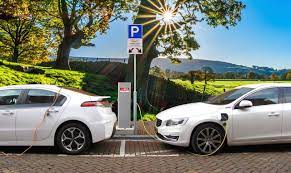The automotive industry is one of the largest industries in the world
And it is constantly evolving with new technological advancements. Electric cars and motorcycles are one such advancement that has been gaining popularity in recent years. With the world’s growing concern for the environment, the demand for electric vehicles is increasing. In this article, we will explore the impact of electric cars and motorcycles on the future of the automotive industry.

Electric cars and motorcycles are becoming more popular due to their eco-friendly nature. Unlike traditional gasoline cars, electric cars and motorcycles are powered by batteries that can be recharged using electricity. This means that they emit zero harmful pollutants, making them a more sustainable option for the environment.
The growing concern for the environment is one of the main reasons why electric cars and motorcycles are gaining popularity. The automotive industry is one of the largest contributors to carbon emissions, and electric vehicles can significantly reduce the industry’s carbon footprint. This has led many governments around the world to introduce incentives for electric vehicle owners, such as tax breaks and subsidies, to encourage more people to switch to electric vehicles.
Another advantage of electric cars and motorcycles is their low maintenance costs.
Traditional gasoline cars require regular oil changes, transmission checks, and other routine maintenance that can be expensive. Electric vehicles, on the other hand, require much less maintenance. They have fewer moving parts, and the electric motor doesn’t require oil changes or other routine maintenance. This means that electric vehicle owners can save money on maintenance costs over the life of the vehicle.
Electric cars and motorcycles also offer a more enjoyable driving experience. Electric motors provide instant torque, which means that they can accelerate quickly and smoothly. This makes them ideal for city driving, where quick acceleration and smooth braking are essential. They are also much quieter than traditional gasoline cars, which can make for a more peaceful driving experience.
One of the challenges facing the electric vehicle industry is the high cost of electric vehicles compared to traditional gasoline cars. However, this is changing as battery technology improves and production costs decrease. The cost of batteries has decreased significantly in recent years, and this trend is expected to continue. As battery costs decrease, electric vehicles will become more affordable, making them more accessible to a wider range of consumers.

The electric vehicle market is also expected to benefit from the development of autonomous driving technology. Autonomous driving technology is being developed by many of the major automotive manufacturers, and it has the potential to revolutionize the way we travel. Autonomous electric vehicles could provide a safer and more efficient mode of transportation, reducing traffic congestion and accidents on the roads.
The impact of electric cars and motorcycles on the automotive industry extends beyond just the vehicles themselves. The production of electric vehicles requires different supply chains and manufacturing processes than traditional gasoline cars. This means that the adoption of electric vehicles will require significant changes in the automotive industry’s manufacturing and supply chain processes. It also means that new jobs will be created in the electric vehicle industry, as companies ramp up production of electric vehicles.
Electric vehicles also have the potential to disrupt the energy industry. The increased demand for electricity to power electric vehicles will require new sources of energy generation, such as renewable energy sources like wind and solar power. This could lead to significant changes in the energy industry and create new opportunities for renewable energy companies.
The impact of electric cars and motorcycles on the future of the automotive industry is significant.
As the demand for electric vehicles increases, traditional gasoline cars will become less popular. This will require the automotive industry to shift its focus towards electric vehicles and invest in the necessary technology and infrastructure to support them.
The adoption of electric vehicles will also require changes in government policies and regulations. Governments will need to provide incentives for electric vehicle owners, such as tax breaks and subsidies, to encourage more people to switch to electric vehicles. They will also need to invest in the necessary infrastructure, such as charging stations,
to support the growing number of electric vehicles on the roads.
One potential challenge for the electric vehicle industry is the availability of rare earth minerals. These minerals are used in the production of electric vehicle batteries and other components. The demand for these minerals is expected to increase significantly as the adoption of electric vehicles grows. However, the availability of these minerals is limited, and their extraction can have environmental and social impacts. This means that the electric vehicle industry will need to find new ways to source these minerals sustainably.
Another challenge for the electric vehicle industry is the range of electric vehicles. While the range of electric vehicles has improved significantly in recent years, it is still limited compared to traditional gasoline cars. This means that electric vehicles may not be suitable for long-distance travel or for people who live in areas with limited charging infrastructure. However, as the technology continues to improve, the range of electric vehicles is expected to increase, making them a more viable option for a wider range of consumers.
In conclusion,
Electric cars and motorcycles have the potential to revolutionize the automotive industry. They offer a more sustainable and eco-friendly alternative to traditional gasoline cars, and they provide a more enjoyable driving experience. The adoption of electric vehicles will require significant changes in the automotive industry’s manufacturing and supply chain processes, as well as in government policies and regulations.
The electric vehicle industry also faces challenges, such as the availability of rare earth minerals and the limited range of electric vehicles. However, as the technology continues to improve and production costs decrease, electric vehicles are expected to become more affordable and accessible to a wider range of consumers. The impact of electric cars and motorcycles on the future of the automotive industry is significant, and it is an exciting time for the industry as it continues to evolve and adapt to new technological advancements.













